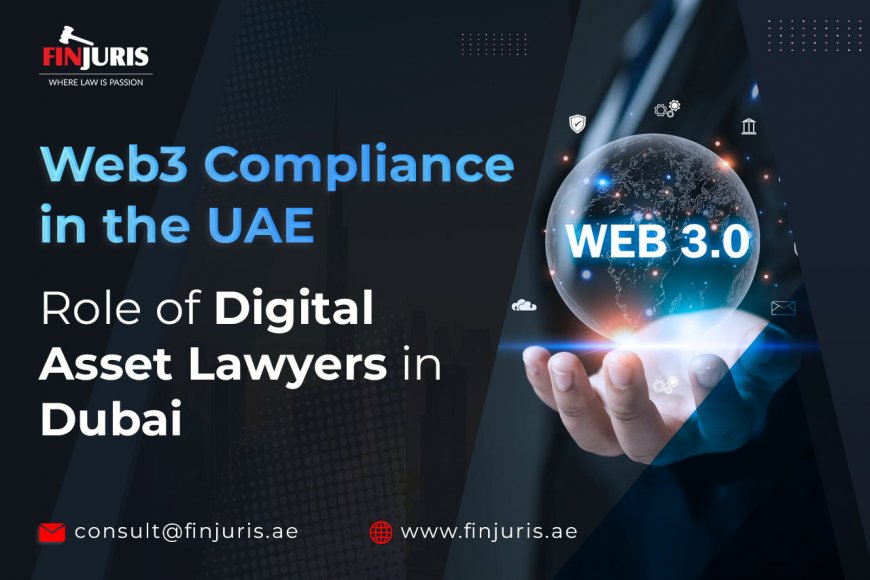Web3 Compliance in the UAE: Role of Digital Asset Lawyers in Dubai
Web3 compliance in the UAE is key. Discover how digital asset lawyers in Dubai assist businesses in navigating crypto laws and regulations.

Web3 is a disruption in the way that the internet has worked—moving from centralized platforms to a decentralized ecosystem facilitated by blockchain technology, smart contracts, and tokenized assets. Together, these elements will allow users access to real ownership of their digital property assets and facilitate seamless peer-to-peer interactions over decentralized protocols. Digital assets include cryptocurrencies, NFTs, security tokens, and other digital representations of real-world value.
As is the case with most advancements that take hold, there comes a certain level of accountability and expectation of responsible use of new technologies. As Web3 applications grow—DeFi platforms, NFT markets, metaverse applications, DAOs—governments around the world are actively putting new rules around their laws to regulate for financial risk, protect consumers, and drive transparency. The UAE is currently being seen as a regulator at the top of their game and has made notable mentions of Dubai as a place to do business.
For any startups, and enterprises that are working in the Web3 space, ensuring that Web3 compliance in the UAE isn't an option. The necessity of undertaking digital asset regulations in Dubai and the requirement of crypto legal advisors in Dubai are going to be more important than ever. Failing to be compliant, might lead to significant penalties, licensing delays, and licensing being completely barred.
Must Read: Crypto License in Dubai: Everything You Need to Know in 2025
Web3 and Digital Assets: Learning the Legal Landscape in the UAE
A Tiered Regulatory Model
The UAE has established a Web3 regulatory model that is both advanced and tiered. The country has free zones, each with its own regulatory body specific to blockchain based business models:
VARA (Virtual Asset Regulatory Authority) – Dubai
VARA was created under Law No. 4 of 2022 and governs virtual assets in Dubai (other than DIFC). VARA provides guidance and licensing for exchanges, custodians, NFT platforms, and advisers. VARA uses a rulebook framework of:
- Company Rulebook
- Compliance & Risk Management
- Technology & Information Requirements
- Market Conduct Rules
Each business type—broker-dealers, lending platforms, VA management companies and custody services—has its own specific rules and mandatory disclosures.
Guidance: A Step-by-Step Guide on How to Obtain a VARA License in Dubai
ADGM (Abu Dhabi Global Market)
Digital asset activities in ADGM are regulated by the Financial Services Regulatory Authority (FSRA), including tokenized securities, DeFi activities, and NFT structures. The FSRA launched their Virtual Asset Framework in 2018, and it has been continuously updated since then. The FSRA uses a strict model of financial conduct that follows international standards.
DIFC (Dubai International Financial Centre)
DIFC is regulated by the Dubai Financial Services Authority (DFSA); it has its own Crypto Token Regulatory Framework. In addition, DFSA is also supportive of its innovation sandboxes, allows for tokenized securities from companies, and supports limited retail offerings (for example, allowing companies to offer their products for testing under a highly restricted compliance environment).
Onshore UAE (Outside the Free Zones)
The Securities and Commodities Authority (SCA) and the Central Bank of the UAE, regulate crypto businesses in onshore UAE. Under Federal Law No. 14 of 2018 and Cabinet Resolution No. 111 of 2022, VASPs operating outside of free zones as subjects to register with SCA and adhere to significant capital, risk and disclosure conditions.
Overview of Regulated Assets
- Virtual Assets (VAs): Subject to regulation across all zones which includes cryptocurrencies and utility tokens. VAs require licensing.
- Security Tokens: Virtual assets intended to represent tokens on securities (shares, bonds, real estate) are permitted by the ADGM and DIFC.
- Crypto Exchanges: Retail platforms require VARA licensing, while institutional platforms need ADGM or DIFC.
These frameworks establish a balance for innovation and legal accountability- thus providing the UAE security to foster blockchain growth.
Why Web3 Startups Need Legal Compliance
The True Costs of non-compliance
A Web3 startup that ignores the legal structure it needs could face serious ramifications:
- Significant fines - Breaching regulations in the UAE can lead to fines as high as AED 10m.
- Stopping your business - A banned or black-listed regulated NFT marketplace or exchange is inoperable.
- Delays for licenses - If a project is not VASP or VARA approved, its hard for investors to want to invest.
- Damaged reputation - Missing AML / KYC processes could result in the world scrutinizing you or could trigger a de-risking from banks.
How Digital Assets Lawyers Mitigate Risk
Read more: Crypto Consulting Services: Empowering Businesses in the Digital Asset World
VASP Licensing (Virtual Asset Service Providers)
Lawyers assist startups in establishing their entity type and their intended activities (broker, regulated exchange, manager), as well as in the application processes and financial reporting obligations to either VARA or ADGM.
AML/KYC Compliance
UAE imposes risk-based client onboarding, transaction monitoring, and a duty to report (SRT - Suspicious Transaction Reporting) on transactional activity. A competent legal team helps you articulate and document a customs and onboarding process often in consideration of global FATF and EU standards.
Data Privacy, Cross Border Compliance
With the explosion of data protection laws in the UAE (such as PDPL) and beyond (GDPR), lawyers ensure your customer information - often collected in KYC - is stored, processed and protected properly.
Startups that contract legal advisors earlier gain speed through the licensing labyrinth, and avoid last minute legal challenges.
The Functions of Digital Asset Lawyers in Dubai
Digital asset lawyers play a larger and larger role in Dubai as the city establishes itself as a crypto capital.
Digital asset lawyers do not solely consider just documentation. They also:
- Regulatory Navigation: They advise you on which zone to register in (VARA vs. DIFC vs. ADGM) based on your business model, liquidity and regulatory overhead.
- Smart Contract Legal Review: They examine contracts to highlight enforceability, user protection clauses, liability protection clauses, dispute resolution provisions and requiring compliance with local laws.
- Tokenomics & Disclosures: They will help founders structure their tokens (utility, non-security, governance) and prepare whitepapers that do not mislead promise holders.
- IP Protection & Licensing: For NFT and metaverse projects lawyers can draft copyright registrations, IP licensing, and resale rights, among others.
- Dispute Resolution and Enforcement: Whether it be fraud, hacking or breach of contract, a digital asset lawyer is often the first nature of offence.
Digital asset lawyers look to become long-term partners—not only document drafter— especially for DAO's, token funds, DeFi protocols and cross-border NFT platforms.
Crucial Compliance Services Provided by Finjuris
Finjuris is a legal advisory firm with offices in Dubai, focusing on blockchain and Web3, and at the cutting edge of digital asset law in the Middle East. Finjuris offers multi-disciplinary legal advisory solutions comprised of lawyers, compliance officers, and blockchain practitioners offering comprehensive legal support to startups, scale-ups, and enterprises in the fast-moving arena that is Web3. Below are their critical compliance services, all intended to enable clients to launch, accelerate, and maintain their digital businesses in legal compliance.
1. NFT Legal Compliance in UAE
Insight: Real Estate Tokenization: Revolutionizing Property Investment
The non-fungible token (NFT) marketplace is growing rapidly according to the size of the market, but there is often a lack of legal clarity. Finjuris offers end-to-end legal services covering the whole lifecycle of NFTs. Finjuris' services include:
- Drafting and reviewing NFT minting agreements and smart contracts;
- Licensing frameworks for artists, platforms and collectors;
- IP and copyright law compliance - originality verification and ownership rights;
- Structuring royalty agreements for resale profits;
- Jurisdictional risk profiles for NFTs sold internationally;
Providing insight on taxation of NFT transactions under UAE laws and, where appropriate, international tax provisions.
Whether you're looking to establish an NFT marketplace, a gaming collectible, or an art token, Finjuris provides creators and platforms with a legal pathway to operate without infringing on the law and maintain their intellectual property rights.
2. Crypto Token Auditing and Legal Review
Launching a utility or security token is more than just the technical aspects of tokenomics; it is also about the rigorous legal analysis. Finjuris performs a full token audit which reviews:
- Regulatory classification under UAE regulations (VARA, ADGM, DIFC) and foreign regulations (e.g., SEC, MiCA)
- Legal review of whitepapers, marketing documents and investor disclosures
- Review of token allotment, vesting and lock-in periods of the issuances and protocols as a whole to ensure that it is fair and equitable to all stakeholders
- Legal structure for governance tokens, staking rewards and utility use of the token
- Cross-border regulatory risk mitigation and if you can legally trade it in the secondary market
- Discussion on any tax obligations on the issuer and the holder of the tokens, based in the UAE
From a legal and regulatory perspective, the token auditing process helps to prevent confusion over the legal classification of the tokens or regulatory enforcement actions - especially when the issuing company is attempting to raise capital through an ICO or through private sales.
3. DeFi Regulatory Frameworks
Learn more: Crypto Consulting Services: Navigating the Future of Digital Finance
Decentralized Finance (DeFi) protocols are changing banking, lending and asset management, but the uncertainty with regard to regulation can hinder progress. Finjuris provides bespoke legal support for:
- The structuring of DAOs (Decentralized Autonomous Organizations) under UAE/different offshore laws and regulations
- Drafting Terms and Conditions, Privacy Policy, and Risk Disclosure for DeFi platforms
- Assessing legal risks involved with leverage and use of liquidity pools, automated market-makers (AMMs), and yield-farming
- Compliance with AML / CFT regulations in a permission-less environment
- Custody or custodial arrangement, governance models for protocols, and smart contract arbitrage
It doesn't matter if you are creating a lending protocol, synthetic (not real) asset exchange, or DAO treasury, securing investor confidence with legal protect, Finjuris will help you reduce your legal and regulatory risk.
4. Exchange Licensing (VARA & ADGM)
Obtaining a license to operate a crypto exchange in Dubai or Abu Dhabi involves clear navigation of various regulatory regimes. Finjuris assists clients at every stage of obtaining a Virtual Asset Service Provider (VASP) License, including:
- Jurisdictional analysis and regulatory strategy (VARA, ADGM or DIFC)
- Corporate structural and incorporation documentation
- Creation of internal policies on AML/KYC, Cybersecurity, and operational security
- Liaising with local financial authorities, including compliance reporting on an ongoing basis
- Assistance with annual license renewals, system upgrades and change of scope of business
Whether you are developing a centralized exchange, an OTC desk, or a peer-to-peer platform, Finjuris can guide you to legal approval and operational integrity.
5.Smart Contract Compliance Review
Smart contracts are at the heart of any decentralized ecosystem, but they must also be compliant with legally enforceable principles. Finjuris provides legal reviews in a detailed way to review:
- The legality of the terms in the smart contract for enforceability under UAE law
- The governance rules, update procedures, and rules for resolving disputes that are coded into the protocol
- The allocation of risks, rules for handling errors, and fallback procedures for hacks or exploits
- Interaction with oracles, custodians, and external APIs
- User consent, and disclosures in user interface or transaction flows
- Regulatory classification (ie. whether or not from the perspective of the contract, it implies a financial service)
This hybrid analysis (legal + technical) will help platforms avoid contract disputes, regulatory fines, and litigation by users.
Additional Services
Finjuris also offers the following services:
- Legal Structuring for Web3 startups: Incorporating in UAE free zones or international jurisdictions, and DAO-compatible entities.
- Cross-Border Tax Planning: Practical advice on crypto tax obligations in multi-jurisdictional situations.
- IP registration for Web3 projects: Protecting brand identity, smart contract code, and creative work.
- Litigation & dispute resolution: Assistance with digital asset fraud, breach of contract, and disputes with investors.
- Regulatory updates & policy advice: Keeping clients aware of the constantly-evolving Web3 and crypto obligations under the laws of the UAE and abroad.
Choosing the Appropriate Web3 Legal Partner in Dubai
Engaging the right legal partner can be the difference between a regulatory win and a reputational loss. What to Consider:
- Experience with Crypto Start-ups: Has the firm serviced token projects, NFT launches, or DAOs? Experience means being able to spot and respond to issues faster.
- Jurisdictional Knowledge: Dubai is a global hub. The best lawyers understand UAE frameworks, but also FATF, EU MiCA and SEC / FinCEN equivalent approaches.
- Smart Contract and Blockchain Understanding: It's not just having the ability to write contracts that concern compliance, but also the ability to appreciate the code structure logic and its associated legal risks.
- Trust and Relationships with Regulatory Bodies: Having a team that has successfully navigated VARA, the DFSA, and the FSRA creates velocity for the client, while establishing credibility with regulators.
- Reputation and Client Testimonials: Look for published case studies, references from clients and engagement with the community.
Early Legal Engagement Aids Future Success
In the rapidly-expanding world of Web3, compliance can't just be an afterthought. The UAE is forerunning the legal side of the industry by establishing dedicated regulatory authorities (e.g., VARA) and enveloping the use of blockchain technology in regulatory frameworks that enable innovation whilst balancing public interests.
For founders, investors, and businesses operating in the UAE, the role of digital asset lawyers in Dubai has never been so significant. Whether it is Web3 compliance in the UAE, crypto legal consulting services, or token audits, lawyers who have legal expertise on the entire stack ensure that your start-up is scalable, safe, and credible.
If you are building on blockchain technology in the UAE, it is wise to start engaging a professional legal team before an enforcement agent knocks on your door. Engage a qualified legal team from start and turn your compliance from a barrier into a competitive advantage.
What's Your Reaction?




















